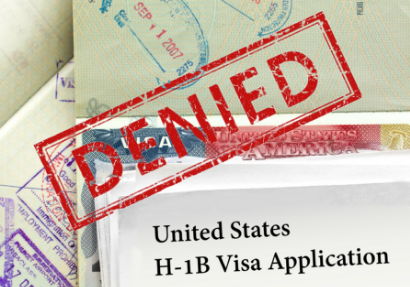Increasing H-1B Denials Drive Visa Holders to Permanent EB-5 Visa Option
 Recent challenges surrounding the United States’ H-1B visa program, which allows American employers to temporarily hire skilled foreign workers, have gained global attention as the denial rate steadily increases. As per statistics from the United States Citizenship and Immigration Services (USCIS), 61,346 petitions initially were rejected in 2018, up from 13,073 in 2015. And this year, that number is on track to climb to approximately 100,000 with almost 25,000 petitions denied initially for first quarter 2019.
Recent challenges surrounding the United States’ H-1B visa program, which allows American employers to temporarily hire skilled foreign workers, have gained global attention as the denial rate steadily increases. As per statistics from the United States Citizenship and Immigration Services (USCIS), 61,346 petitions initially were rejected in 2018, up from 13,073 in 2015. And this year, that number is on track to climb to approximately 100,000 with almost 25,000 petitions denied initially for first quarter 2019.
Forbes noted in its article titled “New Data Show H-1B Denial Rates Reaching Highest Levels” that almost every top employer on the USCIS list saw increases in their denial rates for H-1B petitions for continuing employment between FY 2018 and the first quarter of FY 2019.
The recent challenges with H-1B visa approvals have many people concerned, including existing H-1B holders who wish to renew their visas since if the visas get denied, they will be forced to return to their native country after potentially spending a decade or more living a well-established life in the United States. This could include uprooting their spouse and children, much like the family mentioned in this Wired article titled “Visa Rejections For Tech Workers Spike Under Trump.”
The H-1B visa has other inherent challenges, such as the dependency on an employer to provide sponsorship. Ultimately, the visa holder is at the mercy of their sponsoring employer and may not be able to freely advance their career as a permanent U.S. visa holder would be able to do. This employer dependency also limits where the visa holder may live since they likely need to reside in a city near their job. Further, if the visa holder were to lose their job, they may also lose their visa status and thus need to return to their native country.
Because of these difficulties, current H-1B visa holders, and foreigners wishing to immigrate, are turning to other solutions to live in the U.S. permanently, such as the EB-5 investor visa.
The EB-5 Immigrant Investor Visa Program provides a method for eligible foreigners and their families to become permanent U.S. green card holders. In sharp contrast to the H-1B visa — which enables a foreigner to work in the U.S., potentially taking a job from an American — the EB-5 visa program was created in 1990 by the United States Congress to stimulate the U.S. economy by creating jobs for American workers. The current minimum investment amount is $500,000, provided the EB-5 project is in a Targeted Employment Area, and this single investment grants a green card for the investor, spouse and all unmarried children under the age of 21.
Upon approval of the initial EB-5 petition, the family is granted a two-year conditional green card and can move to the United States at that time. There is no employer or other sponsorship required, so the investor may apply for any job they like, live in any U.S. city, and start a business wherever they like in the U.S. And, the investor may have the opportunity to potentially earn a return on their $500,000 investment. Of course, finding the right EB-5 partner is critical.
“Potential EB-5 investors should be careful to choose a strong EB-5 partner when considering an EB-5 project in which to invest,” said Francis Lively, CEO and President of The LCP Group, L.P., a 45-year-old real estate investment management firm that has helped more than 1,000 foreign investors on their path to permanent U.S. residency via the EB-5 program. “In addition to getting your permanent green cards, an investor should also expect a good return on their $500,000 investment. It is imperative to work with a firm that has a strong performance track record.”
It is important to note that the EB-5 program is also currently under scrutiny and that the $500,000 investment amount may more than triple within the next six to eight months. Given this plus the challenges surrounding the H-1B visa, there may be no better time to consider an EB-5 visa for those interested in permanent U.S. residency. After all, it’s faster, permanent and requires no sponsorship.











